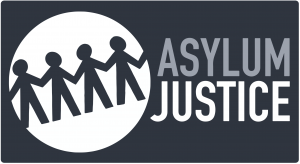Abdullah
“I never thought that during my lifetime I would have to leave my home. We were a wealthy family with a farm and many livestock animals, but then the war came to our area, and everything was burnt to the ground. My father was detained as he was accused of giving food and clothing to the rebels. He was tortured and passed away shortly afterwards.”
Abdullah came to the UK in 2014 and was granted leave in the same year. He came alone to the UK, leaving his wife in Sudan because the journey was too dangerous. As soon as he was granted leave, he worked hard to learn English, to integrate, and to learn the way of life in Wales. At the same time, he worked hard to gather together the documents he needed to apply for family reunion. This took him nearly 4 years.
“The Home Office treats us as though we come from a fully functioning country like Australia or New Zealand. We come from a very different environment and there are impossible barriers for us to get all the documents which they request. To get a piece of paper to prove our relationship, my wife had to travel the distance of Swansea to Aberdeen travelling on a lorry for three days along a route where hundreds of militias could stop the lorry and loot its passengers.
When I finally came to apply for family reunion, the Home Office asked for even more documents. At this moment in time, I still had hope.
Then they asked for family photos. I have no family photos because my family fled where we were living. It felt like the Home Office were playing a game with me by asking for more and more evidence.”
Abdullah had lost nearly all hope by this stage. He was trying hard to integrate himself, working a lot and building strong relationships in his community. But, even with these positive developments in his life, he felt like he couldn’t live and be truly happy without having his wife there with him.
Then he was referred to Asylum Justice. He could see things might be different this time and he felt optimistic. A lawyer began to help him, primarily by obtaining necessary translations of the transcripts of WhatsApp conversations between Abdullah and his wife, which previous lawyers had failed to do. Asylum Justice also obtained expert evidence authenticating key documents that helped prove their relationship. Again, previous lawyers had failed to do this for him. Without the translations and authentication report, Abdullah’s application would undoubtedly have been refused for a fifth time.
While Abdullah felt confident that his lawyer at Asylum Justice was doing his best to help him, all the delays caused by the pandemic and his country’s embassy meant the wait still felt unbearably long for him.
“I had some very dark months. It had already been 7 years away from my wife, and it just felt like we were never going to be together again. Asylum Justice were doing the best they could, but the delays because of the pandemic and the long application process were really difficult for me. At this point they helped to refer me for support with my mental health.
Finally, 4 months after this very dark period, the visa was approved.
“Asylum Justice really know how to help people and to help them to resolve their problems. Everyone was very understanding and kind. If everyone were like them then this world would be a much better place.”
Finally, Abdullah and his wife are together again and can begin to heal and start afresh. Abdullah’s been able to visit nearly every corner of Wales and considers himself to be a Welsh man now.
“The people here in Wales are so friendly and I love the rain. Rain makes Wales a beautiful place. I don’t feel the same way when I am in England. I hope I can learn Welsh someday.
Now I’m thinking about the future – about having a small family and a happy life. I’m also always thinking about my country and trying to help the people in my country as much as I can.
I am very happy that Asylum Justice exists. The work their lawyers do is very serious, helping people hugely. It’s a good choice to fund this organisation, as it’s changing people’s lives.”










